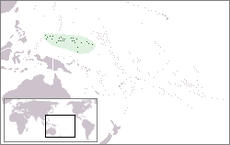LGBT rights in the Federated States of Micronesia
| LGBT rights in the Federated States of Micronesia | |
|---|---|
 | |
| Same-sex sexual intercourse legal status | Legal |
| Military service | Has no military |
| Discrimination protections | No |
| Family rights | |
| Recognition of relationships | No recognition of same-sex couples |
Lesbian, gay, bisexual and transgender (LGBT) people in Micronesia may face challenges not faced by non-LGBT people. Households headed by same-sex couples are not eligible for the same legal protections available to opposite-sex married couples, as same-sex marriage and civil unions are not allowed.
The Federated States of Micronesia encompasses more than 600 islands and about 100,000 people. The majority of the population identifies as Christian.[1]
In 2011, Micronesia signed the "joint statement on ending acts of violence and related human rights violations based on sexual orientation and gender identity" at the United Nations, condemning violence and discrimination against LGBT people.[2]
Law regarding same-sex sexual activity
Same-sex sexual activity is legal.[3][4] The age of consent is 14, regardless of gender and sexual orientation.
Recognition of same-sex couples
Marriage between same-sex couples is not permitted in the Federated States of Micronesia.
The marriage laws in Kosrae state that a marriage performed in the state will only be valid if the male at the time of marriage is at least 18 years of age and the female at least 16 years of age. As such, marriage is conceptualised and permitted between a man and a woman only.[5]
Discrimination protections
The Federated States of Micronesia does not have any anti-discrimination laws that are inclusive of sexual orientation, gender identity or intersex status. This means LGBTI people are not protected from discrimination in employment, education, health care and other areas of public life. According to a 2015 write-up from the United States Department of State, "there were no reports of societal violence or discrimination against homosexuals or against persons with HIV/AIDS."[6]
In 2016, Micronesia received recommendations from five countries to prohibit discrimination on the basis of sexual orientation and gender identity.[7]
Gender identity and expression
Micronesia does not provide any administrative or legal procedures allowing transgender people to have their identified gender recognised in official documents.[7]
According to 2017 estimates from UNAIDS, about 4.2% of the Micronesian transgender population was HIV-positive.[8]
Military service
Currently, there is no active military for the Federated States of Micronesia, though should such a need arise, the United States is responsible for its defense per mutual agreement.[9]
Living conditions
History
In 1989, an anthropologist recorded a case of a young girl on the island of Pohnpei named Maria who exhibited the habits of a boy and would go walking about at night looking for girls. Family and neighbors held a meeting to discuss the matter, and decided to hold a feast where they would publicly name her a boy. Her hair was cut and she was presented with male clothing, and finally was renamed Mario.[10]
The islands of Chuuk have an indigenous term that refers to a traditional third gender alongside male and female: wininmwáán. This is similar to the māhū of Hawaii.[10]
Societal opinions
Micronesian society tends to be conservative and the LGBT community remains discreet in general. Open displays of affection between same-sex partners may offend.[11] Debates and discussions surrounding LGBT rights tend to be "well off the radar".[7]
The Human Truth Foundation has listed Micronesia at rank 90 for LGBT rights. This was similar to other Pacific nations, such as Palau (86), Nauru (87) and the Marshall Islands (88).[12]
In 2006, an evangelical pastor from The Salvation Army serving as a pastor in Micronesia decried homophobia and conversion therapy and stated his belief that sexual orientation was predetermined.[13]
Statistics
According to 2017 estimates from UNAIDS, there were about 340 men who have sex with men (MSM) in the country.[8]
Summary table
| Same-sex sexual activity legal | |
| Equal age of consent | |
| Anti-discrimination laws in employment only | |
| Anti-discrimination laws in the provision of goods and services | |
| Anti-discrimination laws in all other areas (Incl. indirect discrimination, hate speech) | |
| Same-sex marriages | |
| Recognition of same-sex couples | |
| Stepchild adoption by same-sex couples | |
| Joint adoption by same-sex couples | |
| LGBT people allowed to serve openly in the military | Has no military |
| Right to change legal gender | |
| Access to IVF for lesbians | |
| Commercial surrogacy for gay male couples | |
| MSMs allowed to donate blood |
See also
References
- ↑ "Federated States of Micronesia". Newint.org. Retrieved 1 December 2011.
- ↑ "Over 80 Nations Support Statement at Human Rights Council on LGBT Rights » US Mission Geneva". Geneva.usmission.gov.
- ↑ "State-Sponsored Homophobia" (PDF). Old.ilga.org. Archived from the original (PDF) on 19 July 2013. Retrieved 2016-03-10.
- ↑ "A report on MSM and the Pacific REgion" (PDF). Nfi.net. Retrieved 2016-03-10.
- ↑ "Universal Periodic Review". ARC International. Retrieved 23 December 2015.
- ↑ "Micronesia, Federated States of". U.S. Department of State. Retrieved 27 July 2015.
- 1 2 3 MICRONESIA: A DIVERSE REGION WITH DIVERSE LGBTI LAWS
- 1 2 Country factsheets: MICRONESIA (FEDERATED STATES OF) 2017
- ↑ "The World Factbook". Cia.gov. Retrieved 27 July 2015.
- 1 2 Zimmermann, Bonnie (2015) Encyclopedia of Lesbian Histories and Cultures, Routledge
- ↑ "Local Laws & Special Circumstances of Federated States of Micronesia". travel.state.gov. Retrieved 8 February 2018.
- ↑ LGBT Rights Across the World, Which are the Best and Worst Countries?
- ↑ "Homosexuality in Micronesia". Micsem.org. Retrieved 27 July 2015.